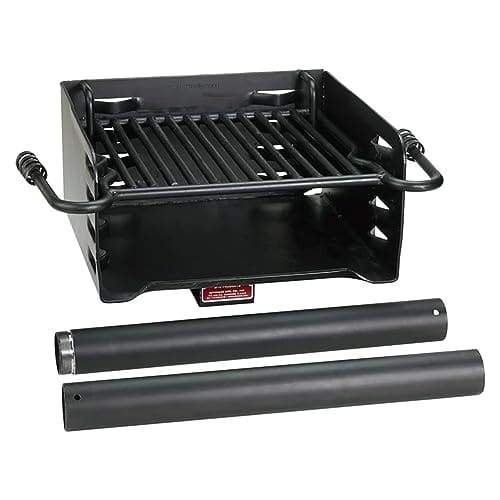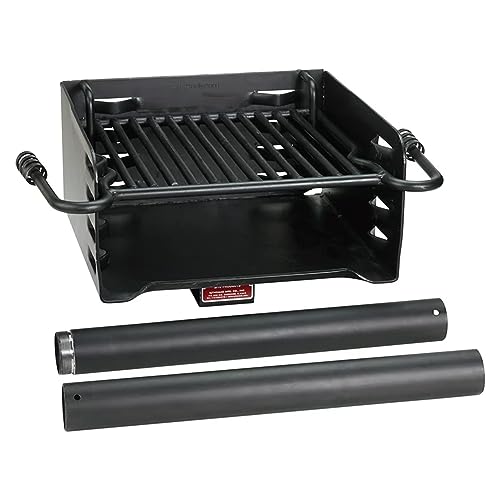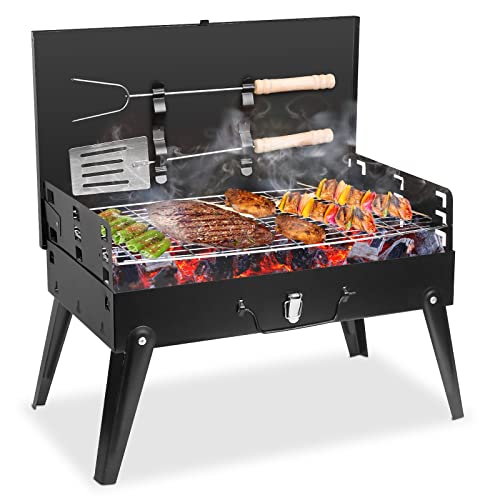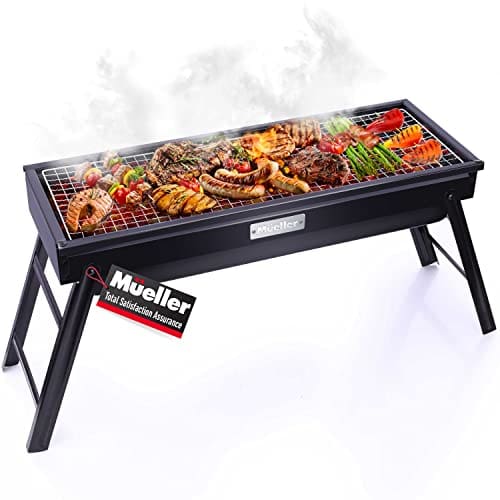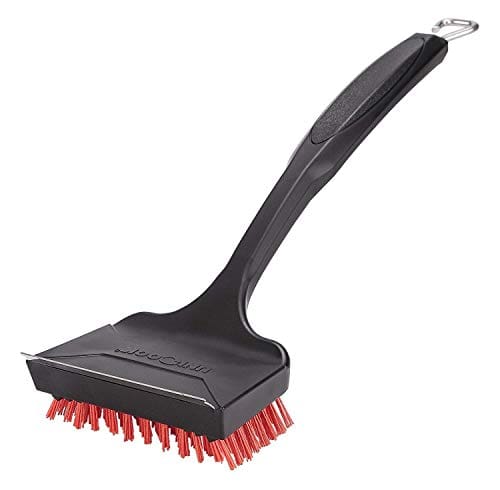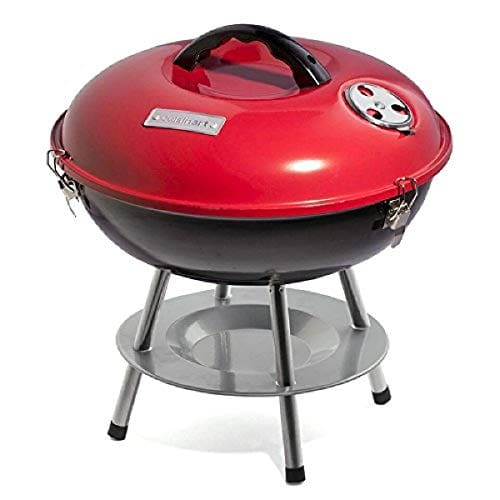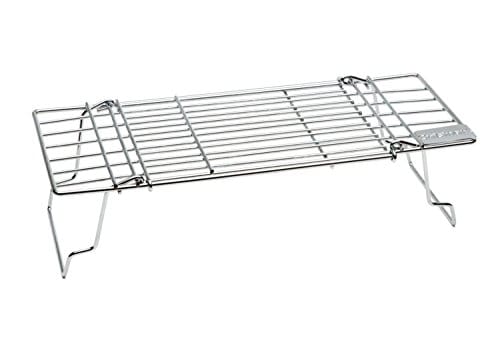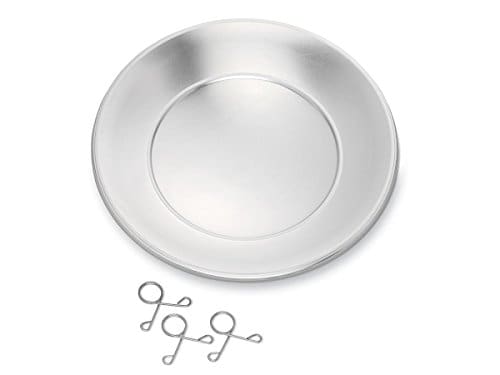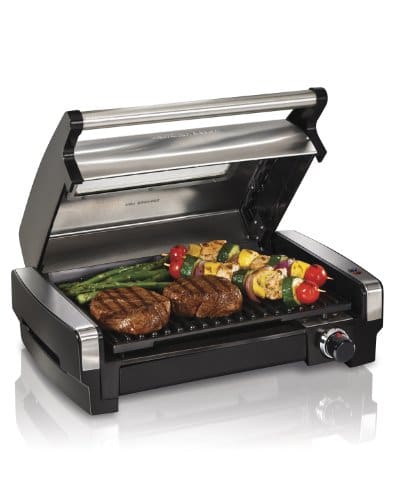Cleaning and Maintenance Tips for Your Picnic Grill
Imagine this scenario: it’s a beautiful sunny day, and you’re ready to enjoy a fun-filled picnic with your loved ones. As you gather around the picnic grill, the aroma of sizzling burgers fills the air, and you can’t wait to dig in. But here’s the thing, without proper cleaning and maintenance, that picnic grill might not perform at its best and could even pose health risks. Don’t worry, though! In this blog post, we will share some valuable tips on how to clean and maintain your picnic grill, ensuring its longevity, efficiency, and most importantly, your safety. So grab a cup of coffee, sit back, and read on to transform your picnic grilling experience into a hassle-free and enjoyable one.
Top-rated picnic grills for the perfect outdoor dining experience
Why Cleaning and Maintenance Are Important
Maintaining and cleaning your picnic grill regularly is crucial for several reasons. Not only does it improve the lifespan of your grill, but it also ensures food safety and enhances the overall grilling experience. In this blog section, we will delve into the importance of cleaning and maintenance, highlighting the benefits and key points to consider.
Benefits of Cleaning and Maintenance
1. Improves the Lifespan of Your Grill
Regular cleaning and maintenance play a significant role in extending the lifespan of your picnic grill. By removing grease, food residues, and dirt, you prevent the accumulation of harmful substances that can corrode the grill’s components over time. A well-maintained grill will function optimally, providing you with many years of enjoyable grilling sessions.
2. Ensures Food Safety
Properly cleaning and maintaining your picnic grill is crucial for food safety. When your grill is free from leftover food particles and grease, you minimize the risk of cross-contamination and the growth of harmful bacteria. By following a regular cleaning routine, you can feel confident that the food you prepare on your grill is safe for consumption.
3. Enhances the Overall Grilling Experience
A clean and well-maintained grill not only ensures food safety but also enhances the overall grilling experience. When your grill is free from residue and debris, it heats up more efficiently and evenly, allowing for better cooking results. You can achieve that perfect sear on your steak or evenly cooked vegetables, making your meals more delicious and enjoyable.
Key Points for Cleaning and Maintenance
To make your cleaning and maintenance routine easier and more effective, consider the following key points:
- Regular Cleaning: Clean your grill after each use to prevent the build-up of grease and food residues.
- Use the Right Tools: Invest in grill brushes, scrapers, and cleaning products specifically designed for your grill type.
- Remove and Clean Grates: Take out the grates and clean them thoroughly to eliminate any stuck-on food particles and grease.
- Clean the Burners: Check and clean the burners regularly to ensure a consistent flame and to prevent blockage.
- Inspect and Replace Parts: Regularly inspect your grill for any worn-out or damaged parts and replace them promptly. This helps maintain optimal performance and safety.
- Cover and Store Properly: After cleaning, cover your grill and store it in a dry, protected area to prevent damage from the elements.
Cleaning Your Picnic Grill: A Step-by-Step Guide
Having a picnic grill is a great way to enjoy outdoor cooking with friends and family. However, regular maintenance and cleaning are essential to keep your grill in top shape and ensure safe and flavorful meals. In this guide, we will take you through the process of effectively cleaning your picnic grill, using various methods and techniques. Let’s get started!
Step 1: Preparing for the Clean
Before you dive into cleaning your picnic grill, follow these necessary steps for a hassle-free cleaning experience:
Gather the following materials:
- Wire brush
- Cleaning solution (commercial or homemade)
- Soft cloth or sponge
- Warm water
- Gloves
- Plastic bag
Ensure safety precautions:
- Disconnect and turn off the gas supply (if applicable) to prevent accidents.
- Allow the grill to cool completely before starting the cleaning process.
Step 2: Cleaning the Grates
The grates are the most critical part of your picnic grill and require regular cleaning to remove food residue and prevent rust. Here are two popular methods:
Method 1: Using a Wire Brush
- Ensure the grill has cooled down completely.
- Use a wire brush to scrub the grates vigorously, removing any stuck-on food.
- Pay attention to any visible rust spots and scrub them off.
- Use a damp cloth or sponge to wipe away any remaining debris.
Method 2: Soaking in Cleaning Solution
- Fill a basin or sink with warm water and add a grill cleaning solution according to the manufacturer’s instructions.
- Remove the grates from the grill and place them in the solution.
- Allow the grates to soak for the recommended time (usually around 30 minutes).
- Use a wire brush or scrubbing pad to remove any remaining residue.
- Rinse the grates thoroughly with water and pat them dry before reinserting them into the grill.
Step 3: Cleaning the Burners
A clean burner ensures optimal heat distribution and prevents flare-ups during cooking. Follow these steps to clean your picnic grill burners effectively:
- Detach the burners from the grill according to the manufacturer’s instructions.
- Use a wire brush to gently scrub the burners, removing any built-up grease or debris.
- If necessary, use a toothpick or paperclip to clear any clogged burner holes.
- Rinse the burners with warm water to remove any loose debris.
- Dry the burners thoroughly before reattaching them to the grill.
Step 4: Cleaning the Exterior Surfaces
Maintaining the aesthetics and cleanliness of the exterior surfaces of your picnic grill is as important as the internal components. Here’s how to do it effectively:
- Prepare a mixture of warm water and mild dish soap in a bucket.
- Dip a soft cloth or sponge into the soapy water and gently scrub the exterior surfaces of the grill.
- For stubborn stains, use a non-abrasive cleaner or a mixture of baking soda and water.
- Rinse the exterior surfaces thoroughly with clean water.
- Dry the grill with a soft cloth or allow it to air dry.
Additional Tips
- Regularly empty the grill’s grease tray and clean it with warm soapy water.
- Use a plastic bag to protect the grill’s control knobs from water and cleaning solutions during the cleaning process.
- For a natural cleaning solution, mix equal parts vinegar and water in a spray bottle and use it as an alternative to commercial cleaning products.
Remember, a clean picnic grill not only ensures safe and delicious meals but also prolongs the lifespan of your grill. By following these step-by-step instructions, you can maintain your grill’s performance and enjoy countless memorable picnics. Happy grilling!
Benefits of Regular Grill Cleaning:
- Enhances food flavor and eliminates the risk of cross-contamination.
- Prevents rust formation, prolonging the grill’s lifespan.
- Improve burner efficiency, ensuring even heating and preventing flare-ups.
- Maintains the grill’s overall aesthetics, making it visually appealing.
Comparison Table – Cleaning Methods:
| Cleaning Method | Pros | Cons |
|---|---|---|
| Wire brush | Easy to use and effective | Requires physical effort to remove tough residues |
| Soaking in cleaning solution | Offers deep cleaning with minimal effort | Requires additional time for soaking |
| Use of natural remedies | Environment-friendly and cost-effective | May not be as potent as commercial cleaning solutions |
Please note that the specific steps and recommendations in this guide may vary depending on the type and model of your picnic grill. Always consult the manufacturer’s instructions for the best cleaning practices.
Regular Inspections
Regular inspections are crucial to ensure the longevity and performance of your picnic grill. By conducting routine checks, you can identify any potential issues or damages before they worsen. Here are some key areas to inspect:
- Burners: Check for any clogs or blockages that may affect the gas flow. Ensure the burners are evenly distributing heat.
- Grates: Examine the grates for rust, food residue, or debris. Clean them thoroughly to avoid any interference with the cooking process.
- Gas Lines: Inspect the gas lines for cracks, leaks, or signs of wear and tear. Replace any damaged parts immediately.
Lubrication of Moving Parts
Lubricating the moving parts of your picnic grill is essential to maintain smooth operation and prevent unnecessary friction. Here are a few components that may require lubrication:
- Hinges and Latches: Apply a thin layer of lubricant to hinges and latches to ensure they open and close smoothly.
- Wheels: Lubricate the wheels to enhance maneuverability when moving the grill around.
- Ignition System: If your grill has an ignition system, lubricate the ignition button and battery compartment to ensure reliable sparks.
Greasing the Grill
Properly greasing your picnic grill will not only enhance the flavor of your food but also assist in preventing rust and corrosion. Here’s how to grease your grill effectively:
- Grates: Apply a thin layer of cooking oil or non-stick spray to the grates before each use. This will prevent food from sticking and make cleaning easier.
- Drip Trays: Clean and grease the drip trays regularly to prevent buildup and facilitate better heat distribution.
- Moving Parts: Apply a small amount of food-safe lubricant to any movable parts to prevent rust and ensure smooth operation.
Checking for Potential Issues or Damages
Regularly checking for potential issues or damages will help you catch any problems early on and prevent further complications. Here are some areas to inspect:
- Gas Regulator: Monitor the gas pressure to ensure it remains steady. If you notice any irregularities or fluctuations, consider replacing the gas regulator.
- Ignition System: Test the ignition system to ensure consistent sparking. If you encounter any issues, clean or replace the ignition components as necessary.
- Propane Tank: Inspect the propane tank for any leaks or damage. If you detect a leak or suspect any issues, consult a professional before using the grill.
Storing Your Grill During the Off-Season
Properly storing your picnic grill during the off-season will protect it from the elements and prolong its lifespan. Follow these steps:
- Clean Thoroughly: Remove any food residue, grease, and debris from all surfaces. This will prevent pests and corrosion during storage.
- Cover Up: Use a grill cover specifically designed for your grill model to protect it from dust, rain, and UV rays. Ensure the cover is snug and secure.
- Choose a Dry Storage Area: Store your grill in a dry and well-ventilated area. Avoid storing it near combustible materials.
By following these essential maintenance practices, you can ensure your picnic grill remains in top shape for many enjoyable cookouts to come.
Key Benefits of Regular Grill Maintenance:
- Enhanced safety during cooking
- Prolonged lifespan of the grill
- Improved flavor and cooking performance
- Cost savings by avoiding major repairs or replacement
Remember, a well-maintained picnic grill leads to delicious meals and enjoyable outdoor experiences!
Safety Measures and Troubleshooting
Safety should always be a top priority when using and maintaining your picnic grill. By following proper safety measures, you can ensure a safe and enjoyable grilling experience for yourself, your family, and your friends. Additionally, understanding how to troubleshoot common issues will help you keep your grill in good working condition. In this blog section, we will outline important safety measures and address common troubleshooting problems that may arise with your picnic grill.
Safety Measures for Your Picnic Grill
When it comes to safety, there are several key measures to keep in mind. Implementing the following precautions will help prevent accidents and ensure the well-being of those around your grill.
- Check Gas Connections: Before using your picnic grill, it’s crucial to inspect the gas connections carefully. Make sure all connections are secure and free from any leaks or damage. To check for leaks, perform a simple soap and water solution test by applying the mixture to the connections. If you observe any bubbles forming, it indicates a gas leak, and you should immediately turn off the gas and seek professional assistance.
- Keep Grill in a Well-Ventilated Area: Grilling should always be done in a well-ventilated area to prevent the buildup of carbon monoxide. Never operate a grill indoors, in a garage, or in other enclosed spaces. Ensure that there is proper airflow to avoid any health hazards.
- Practice Proper Fire Safety: It’s important to practice fire safety whenever you use your picnic grill. Keep a fire extinguisher nearby, and know how to use it. Never leave your grill unattended while in use and always keep an eye on open flames. Additionally, be cautious when using lighter fluid and follow the manufacturer’s instructions carefully.
Troubleshooting Common Issues
Even with proper maintenance, you may encounter some common issues with your picnic grill. Knowing how to troubleshoot these problems will help you resolve them quickly and effectively.
Uneven Heat Distribution
One common problem is uneven heat distribution, which can result in improperly cooked food. Here are a few potential causes and troubleshooting steps:
- Blocked Burner Tube: Check for any obstructions or debris in the burner tubes. Clean them with a brush or compressed air to ensure even heat distribution.
- Worn Out Burner: Over time, burners can wear out and become inefficient. If your grill has uneven heat distribution consistently, it may be time to replace the burner.
- Incorrect Burner Alignment: Ensure that the burners are properly aligned. Adjust them if necessary to achieve more even heat distribution across the cooking surface.
Gas Leaks
Another issue that may arise is gas leaks, which pose potential safety risks. If you suspect a gas leak, follow these steps:
- Turn Off the Gas: Immediately turn off the gas supply at the source or the propane tank valve.
- Extinguish Flames: If the grill is in use, extinguish any flames.
- Check Connections: Inspect all gas connections for leaks using the soap and water solution test mentioned earlier. Replace any damaged or faulty components and tighten connections.
Addressing Rust or Corrosion
Over time, corrosion and rust can affect the performance and longevity of your picnic grill. Here’s how to address these issues:
- Cleaning: Regularly clean your grill to remove any buildup or debris that can contribute to rust or corrosion. Use a grill brush or scraper to remove residue from the grates and surfaces. Clean with warm, soapy water and rinse thoroughly.
- Remove Rust: If rust has already formed, use a wire brush or sandpaper to remove it. Apply a rust-resistant primer and paint specifically designed for grills to protect the metal surfaces.
- Preventive Measures: To prevent rust and corrosion, consider investing in a grill cover to protect your picnic grill from the elements when not in use. Apply a thin layer of cooking oil to the grates to create a barrier against moisture.
By implementing these safety measures and troubleshooting techniques, you can enjoy safe and hassle-free grilling experiences with your picnic grill. Remember, safety always comes first, so take the necessary precautions to ensure the well-being of yourself and others while using your grill.
In case of any emergencies or persistent issues, it is advisable to consult a professional or contact the manufacturer for assistance.
Important Steps to Keep Your Picnic Grill Clean and Well-Maintained
In conclusion, proper cleaning and maintenance of your picnic grill are essential for ensuring its longevity and optimal performance. Throughout this blog post, we have discussed important tips such as scraping the grill grates, using a brush and soapy water, and regularly inspecting and replacing worn-out parts.
By following these tips, you can prevent the build-up of grease and grime, which can not only affect the taste of your food but also pose a potential fire hazard. Moreover, regular maintenance helps you identify any potential issues early on, allowing you to address them promptly and prevent any further damage.
When it comes to maintenance, there are a few factors to consider, such as the type of grill you have, its materials, and your own usage patterns. Take into account the manufacturer’s guidelines and recommendations specific to your grill to ensure proper care.
To guarantee the longevity and functionality of your picnic grill, it is highly recommended to establish a regular cleaning and maintenance routine. By doing so, you will not only extend the lifespan of your grill, but also guarantee a delicious and safe grilling experience every time.
Happy grilling!
